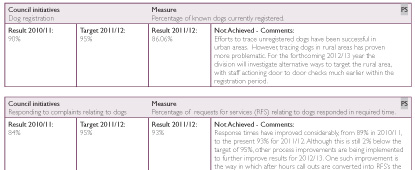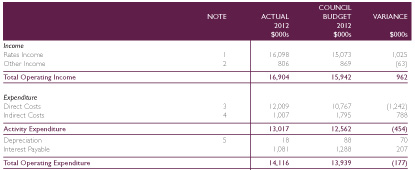At a Glance
Primary Services
- Field services
Why We Do It
Council is responsible for complying with legislation designed to safeguard public health and welfare, minimise environmental risk and protection of cultural interests; such as the Resource Management Act 1991, Litter Act 1979, Local Government Act 1974 and 2002.What Has Changed Since The LTCCP 2009/19?
New liquor licensing and food legislation bringing about changes to administration and inspector roles. These changes to legislation have not taken place at this time, but are expected to soon. As a member of the New Zealand Food Safety Authorities voluntary implementation program Council has begun auditing and assessing food control plans for voluntary food premises.Priorities For 2011/12 |
What We Have / Haven't Achieved |
|---|---|
| Actively progressing the review of the regulatory bylaws and policies to completion | All bylaws requiring review have been completed. The latest, Chapter 13, Keeping of Animal, Poultry and Bees has completed public consultation stage and will be completed within the required time, by the end of 2012. |
| Increasing dog registration | The number of dogs registered and the number of known dogs not registered dropped by approximately 400, even though a project of carrying out property checks was in place. For 2012/13 a new practice has been implement, starting with follow ups on returned mail for the 2012/13 registration year, to identify previously registered dogs that have not been registered, or reported as dead or left the district. |
| Improving response times | Responses to Request for Services (RFS) have consistently been above the KPI target of 90% responses on time, and is averaging between 95 - 98%. |
| Targeting problems associated with wandering stock | A number of ongoing problematic locations have been resolved by working with stock owners. One such case resulted in the stock owner selling off the majority of stock, which were roaming wild in bush, and getting out onto roads due to poor fencing. |
| Targeting problems associated with illegal dumping of rubbish | Council is working with contractors, such as the contractor response for emptying the street litter bins, to identify and infringe persons using those bins to dispose of household and business rubbish. This has increased the number of infringement notices issued. |
Future Issues / Challenges |
Implications |
|---|---|
| To identify and reduce the number of unregistered dogs | The identification of unregistered dogs is a perpetual problem requiring much officer time in registering dogs. Many dogs are in remote locations, requiring long periods of travel and time, and some are found to belong to difficult owners. |
| The introduction of new legislation for the control of food premises will require considerable changes to the way in which officers carry out their duties | Dual systems will need to be managed during the transition period when the new legislation is passed. |
| Increase dumping of illegal rubbish in some areas | Increase cost to the ratepayer in cleaning up and disposing of rubbish. By targeting these areas, the aim is to infringe or prosecute identified offenders; and therefore reduce the level of illegal dumping. |
| Increased incidents of emergency events due to climatic change; such as flooding, and conversely, dry weather events such as fire risk | Increase cost on the ratepayer in dealing with emergency events and risk of damage to proper ties and utilities. |
| Anticipated changes to liquor licensing legislation are expected to give the agency more powers and responsibilities | Possible need to review resources and processes. |
| Reduction of parking service | Apart from the enforcement of the instant infringement offences by the monitoring team, there has been seasonal coverage in Paihia (Labour weekend to Easter weekend included), and full coverage in Kerikeri during the summer season, and 2 days per week in the off peak season. |
Highlights of Performance

TPM = Total number of Performance Measures
 Performance 2010/11 vs. 2011/12 - needs improving
Performance 2010/11 vs. 2011/12 - needs improving
Statement of Service Performance
For FIELD SERVICES the following pages detail:- Service performance information provides levels of service comparative results for 2010/11 and 2011/12 including achievements and issues.
- Financial performance including comparisons against budget 2011/12.
 Print the above sections
Print the above sections

